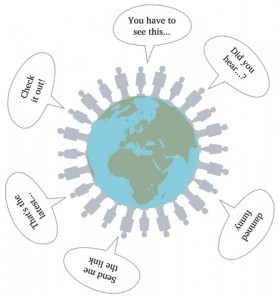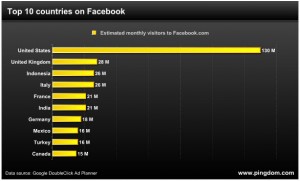
The seemingly unstoppable rise of social media has changed how people make connections and how they communicate.
In the mere seven years since Facebook was launched – it wasn’t the first social networking site but it has grown into the undisputed market leader – social media sites have spread their tendrils everywhere.
Facebook co-founder Mark Zuckerberg and Twitter architect Jack Dorsey probably never envisaged their creations being used to ferment revolution but, while for many users they remain merely a way to keep in touch with friends, family and casual acquaintances, they’re increasingly being employed for other purposes.
Jobs are both advertised and sought using social media sites and businesses both large and small are realizing that these sites can make wonderful resources.
Let’s look at some of the issues and topics around social media and global cultures.
The benefits of social media
A recent survey conducted by Ad-ology asked the owners of 1,100 small businesses what they considered to be the greatest benefits of social media marketing. They listed the ability to keep up with developments within their field, to generate leads and to monitor the online conversation about their businesses as the greatest benefits. Social media sites give a unique opportunity to connect and interact with your customers and, given their growing popularity on a global scale, they’re also ideally placed to help you reach a truly worldwide audience.
Despite this fact, Econsultancy’s 2010 Social Media and Online PR report found that, while 83% of marketers had plans to increase their spending on social media this year, only 26% had plans to run campaigns in more than one country.
So are they missing a golden opportunity? There’s clear evidence that website localization can provide a healthy return on investment. The benefits of social media marketing can be slightly less tangible, as the area is often more concerned with garnering feedback, making contacts, raising brand profile and awareness and other areas of PR.
Many marketers are embracing the idea of using the social media however, given the potential new markets that such sites can open up for comparatively little expenditure.
Using familiar sites
Facebook is the single most popular social networking site worldwide. Twitter has a recognized global audience and the business-oriented LinkedIn spans more than 200 countries and territories worldwide, and is available in English, French, German, Italian, Portuguese, Spanish, Romanian, Russian and Turkish. Clearly, the big hitters in the US also have a lot to offer when it comes to making connections around the world.
Add the benefits of familiarity with the format and the fact that you may already have a presence and it would obviously be foolish to ignore these sites.
Pingdom illustrated the growth of Facebook across different cultures as of 2010. The site still has its main user base within the US but there has been a rapid growth within territories such as Malaysia and Italy.

But it’s not all about Facebook
It’s quite possible to simply use the foreign language versions of familiar sites, but within many territories there are local competitors that hold a far greater market share. They may not be that familiar to people outside their own spheres of influence but within them they’re massively important.
In China, for example, Qzone and its associated messaging service QQ are huge, with claims of a staggering 636.6 million active QQ accounts as of September 2010. Cyworld is a market leader in South Korea and Mixi has around 30 million Japanese users.
Outside the huge, established Asian markets, Latin America is coming up fast. Orkut is the most widely used site in the region’s most populous country Brazil and also has a large audience in India.
In Europe, different countries have their own preferences.
IRC-Galleria is the biggest social networking site in Finland for example, while Skyrock is a popular blogging platform in France.
You certainly don’t have to make use of all of these sites or any of the bewildering array that continue to spring up worldwide. If you are concentrating your efforts on particular markets however, it makes sense to research the most widely used sites in those territories and establish your online presence there.
Speaking your audience’s language
It’s one thing to select a platform and quite another to use it. When it comes to getting your message across cultural and linguistic divides, you’re going to have to consider translation. Automatic translation programs such as Yahoo! Babel Fish, Google Translate and a host of lesser known systems can provide an adequate literal translation for getting the general meaning of posts or other content.
They can, however, be prone to contextual errors and are certainly not great when it comes to slang, abbreviations and other colloquialisms, which can be more common online and especially in social media than they may be elsewhere.
Engaging native speaking translators will help avoid mistakes, as well as helping with issues of social etiquette and giving you a ‘local’ voice, all of which can be essential when it comes to approaching different cultures via social media.
About the author
Christian Arno is the founder of professional translation services provider Lingo24, experts in the foreign language internet. Launched in 2001, Lingo24 now has over 150 employees spanning three continents and clients in over sixty countries. In the past twelve months, they have translated over forty million words for businesses in every industry sector, including the likes of MTV and World Bank. Follow Lingo24 on Twitter: @Lingo24.